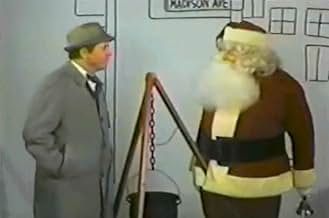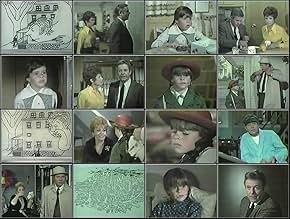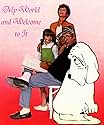John Monroe observes and comments on life, to the bemusement of his sensible wife Ellen and intelligent, questioning daughter Lydia.John Monroe observes and comments on life, to the bemusement of his sensible wife Ellen and intelligent, questioning daughter Lydia.John Monroe observes and comments on life, to the bemusement of his sensible wife Ellen and intelligent, questioning daughter Lydia.
- Won 2 Primetime Emmys
- 2 wins & 5 nominations total
Browse episodes
Featured reviews
I was only 3 when I watched this according to the air date...wow! I remember it fondly and for a long time wondered if it was a product of my imagination. Mostly I remembered William Windom and the interspersed drawn segments, then the girl who played his daughter (I think....memory is funny that way, and I was only 3). Can anyone tell me if this show is available on DVD or anything? I would LOVE to see it again.I really hope it is. So rarely these days do I remember a show so fondly. From what I do remember, this is/was a definite one of a kind show. William Windom was also an excellent actor in this show too, he has to have been...since he was burned into my memory at such a young age. Thankfully it was his appearance as Woody on a rerun of Mama's Family that jogged my mind and made me rush to IMDb to see if he was listed. Thanks to this wonderful site I now know I didn't make it all up...and my memory isn't THAT bad.
Shown on NBC in 1969-70 and and re-run on CBS ca. 1972. "My World and Welcome to It" was a sharp, sophisticated comedy that a curmudgeonly grandfather and an elementary schoolboy could enjoy together. This is *the* show William Windom ought to be remembered for.
The animation of the Thurber cartoons was fantastic. There was an especially funny episode based on the Thurber story "If Grant Had Been Drinking at Appomattox." The cartoonist sits on his young daughter's bed, starting to tell her about the end of the Civil War. "Suppose General Grant had been drinking, uh...." "Cough medicine?!" the girl chirps up. "Uh, yes, cough medicine." And then he goes on to tell the tale....
Suddenly you see William Windom in rumpled dress blues as General Grant, disgracefully drunk by the surrender table, chomping on his cigar, as a distinguished, gray bearded General Lee introduces himself. "General Robert E. Lee of the Army of Northern Virginia."
"Well go on, go ahead!" General Grant snaps as he proffers his sword to an astonished Lee, "Ya darn near licked us!"
(Luckily things didn't quite turn out that way in real life.)
Thurber is timeless, and so is this show. If only reruns of "My World" were run on cable, or at least sold on DVD -- it would hook a whole new generation on the wonderful imagination of James Thurber!
The animation of the Thurber cartoons was fantastic. There was an especially funny episode based on the Thurber story "If Grant Had Been Drinking at Appomattox." The cartoonist sits on his young daughter's bed, starting to tell her about the end of the Civil War. "Suppose General Grant had been drinking, uh...." "Cough medicine?!" the girl chirps up. "Uh, yes, cough medicine." And then he goes on to tell the tale....
Suddenly you see William Windom in rumpled dress blues as General Grant, disgracefully drunk by the surrender table, chomping on his cigar, as a distinguished, gray bearded General Lee introduces himself. "General Robert E. Lee of the Army of Northern Virginia."
"Well go on, go ahead!" General Grant snaps as he proffers his sword to an astonished Lee, "Ya darn near licked us!"
(Luckily things didn't quite turn out that way in real life.)
Thurber is timeless, and so is this show. If only reruns of "My World" were run on cable, or at least sold on DVD -- it would hook a whole new generation on the wonderful imagination of James Thurber!
I remember being thrilled to learn that "My World and Welcome to It" was based on James Thurber's "The Secret Life of Walter Mitty." I recognized the similarities right away after reading the book, which was pretty amazing to me since I was just a kid. I'd love to see it in syndication. Lisa Gerritsen was a wonderful child actress and William Windom was perfect as John Monroe (aka "Walter"). It was well written and well acted. What more could you ask for? It was the perfect mix of reality and fantasy. Most of us live vicariously through television or film a few hours a day, so why not see it through the eyes of the master? We all have a little bit of John Monroe in us. "My World and Welcome to It" is the ultimate in escapism...for just a little while.
For some reason certain shows never last long on television, but retain an affection on their audiences long after they disappear. "He & She" with Paula Prentice, Richard Benjamin, Jack Cassidy, Kenneth Mars, and Hamilton Camp was one of these - it lasted one season only, but it was a truly funny series. Slightly lesser but with good moments was "Good Morning World". And with those two is this show, that only lasted from 1969 to 1970.
It was based on the comedy of one of our wittiest writers, James Thurber - a man who was so good at writing he has been recently republished in the "Library Of America" series of books. Thurber was an essayist mainly, but he wrote short stories ("The Secret Life of Walter Mitty" and "The Greatest Man In the World" are two of his most anthologized works), a comic autobiography ("My World And Welcome To It"), and hundreds of funny cartoons, many chronicling "The War Between Men And Women". What is amazing about Thurber's achievement was the difficulties he encountered - he was a man in poor health (he eventually went totally blind in his last years, but he was still doing those difficult cartoons up to the end, using special crayons and paper). He also had a serious drinking problem.
Thurber's work first appeared in "The New Yorker", and he would develop close working relations with many other leading writers. One friendship was with fellow humorist Robert Benchley. In the series, the character based on Thurber (John Monroe - William Windom), has a friendship with a Benchley clone (Philip Jensen - Henry Morgan) in several of the episodes. Although Thurber was friendly with Benchley, he was never a member of the Algonquin Set that Benchley belonged to (with Dorothy Parker, Harpo Marx, F. P. Adams, George F. Kaufman, Heywood Broun Sr., Marc Connelly, and Alexander Woolcott).
The series followed the normal Thurber point of view, ably translated via the scripts by Windom's perfectly dry and sensible performance as Monroe. Like W.C.Fields, Thurber did not have anything but a jaundiced eye for patriotism, sentimentality, lovable dogs and pets, and perfect marriages. While Windom and Joan Hotchkiss (as his wife) were not at daggers drawn as some of Thurber's more extreme couples (one cartoon of his shows the bodies of a husband and wife, each holding a gun, on the floor - and a reporter only asking a witness what was the make of the bullets), their relationship mirrors his views of how men seem to be more reasonable, and women more excitable and changeable. Whether this is fair I leave to whoever reads Thurber to figure out. However, he usually makes it quite funny.
Windom's character faced problems regarding putting up a flagpole on his property (while applauded by patriotic groups, some wonder why he is doing it, and question his patriotism). He tells stories of his early life from the autobiography (such as "The Night the Bedclothes Fell"). He deals with a children's book writer (played by Paul Ford) who turns out to be less than loving about kids when he's had a snoot full. Windom handled Monroe/Thurber wonderfully, and merited the Emmy award he got for his role. Unfortunately, the series was not renewed. Pity about that, as it was one of the best in terms of writing and acting in television history.
It was based on the comedy of one of our wittiest writers, James Thurber - a man who was so good at writing he has been recently republished in the "Library Of America" series of books. Thurber was an essayist mainly, but he wrote short stories ("The Secret Life of Walter Mitty" and "The Greatest Man In the World" are two of his most anthologized works), a comic autobiography ("My World And Welcome To It"), and hundreds of funny cartoons, many chronicling "The War Between Men And Women". What is amazing about Thurber's achievement was the difficulties he encountered - he was a man in poor health (he eventually went totally blind in his last years, but he was still doing those difficult cartoons up to the end, using special crayons and paper). He also had a serious drinking problem.
Thurber's work first appeared in "The New Yorker", and he would develop close working relations with many other leading writers. One friendship was with fellow humorist Robert Benchley. In the series, the character based on Thurber (John Monroe - William Windom), has a friendship with a Benchley clone (Philip Jensen - Henry Morgan) in several of the episodes. Although Thurber was friendly with Benchley, he was never a member of the Algonquin Set that Benchley belonged to (with Dorothy Parker, Harpo Marx, F. P. Adams, George F. Kaufman, Heywood Broun Sr., Marc Connelly, and Alexander Woolcott).
The series followed the normal Thurber point of view, ably translated via the scripts by Windom's perfectly dry and sensible performance as Monroe. Like W.C.Fields, Thurber did not have anything but a jaundiced eye for patriotism, sentimentality, lovable dogs and pets, and perfect marriages. While Windom and Joan Hotchkiss (as his wife) were not at daggers drawn as some of Thurber's more extreme couples (one cartoon of his shows the bodies of a husband and wife, each holding a gun, on the floor - and a reporter only asking a witness what was the make of the bullets), their relationship mirrors his views of how men seem to be more reasonable, and women more excitable and changeable. Whether this is fair I leave to whoever reads Thurber to figure out. However, he usually makes it quite funny.
Windom's character faced problems regarding putting up a flagpole on his property (while applauded by patriotic groups, some wonder why he is doing it, and question his patriotism). He tells stories of his early life from the autobiography (such as "The Night the Bedclothes Fell"). He deals with a children's book writer (played by Paul Ford) who turns out to be less than loving about kids when he's had a snoot full. Windom handled Monroe/Thurber wonderfully, and merited the Emmy award he got for his role. Unfortunately, the series was not renewed. Pity about that, as it was one of the best in terms of writing and acting in television history.
Usually I don't put up comments when somebody has already said what I wanted to say, but "My World and Welcome to It" was such a good show and I agree so completely with everyone here, that I simply couldn't resist joining this small but enthusiastic chorus. As soon as I get finished here I'm going to email my local PBS station, mention the show, and refer them back to here.
Did you know
- TriviaThe series was based on the writings of humorist and social commentator James Thurber and included Thurber-style animations.
- Crazy creditsFrom the animated opening credit roll: Based on stories, inspirational pieces, cartoons, and things that go bump in the night. By James Thurber. After the credit roll is complete, the animated dog starts to chase James Thurber's name.
- ConnectionsReferenced in Mystery Science Theater 3000: The Giant Gila Monster (1992)
- How many seasons does My World and Welcome to It have?Powered by Alexa
Details
Contribute to this page
Suggest an edit or add missing content

Top Gap
By what name was My World and Welcome to It (1969) officially released in India in English?
Answer






























